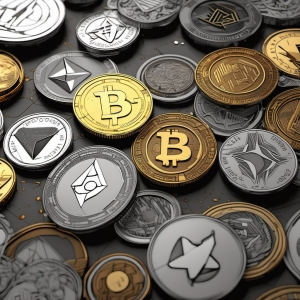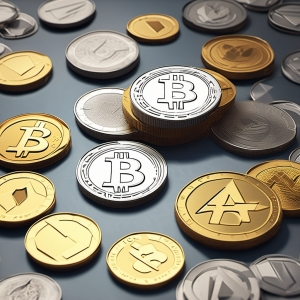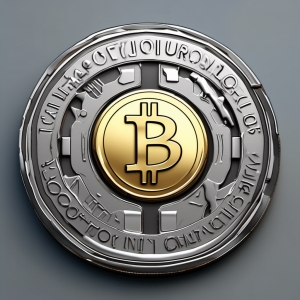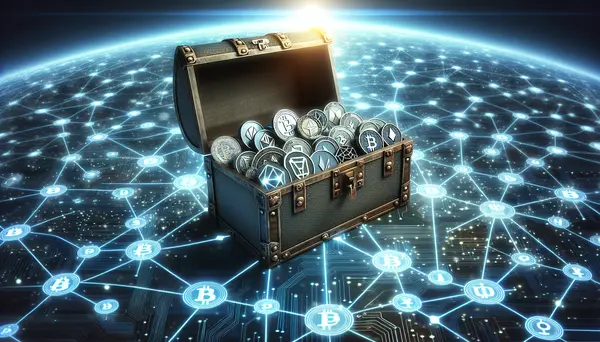Table of Contents:
Introduction to Altcoins
If you've been curious about the world of cryptocurrencies, you've probably heard of Bitcoin, the digital currency that started it all. However, Bitcoin is just the tip of the iceberg in the wide sea of cryptocurrencies, aptly termed as Altcoins. Short for 'alternative coins', Altcoins have burgeoned in the last decade, each offering unique features and potential for growth. This section will provide a beginner-friendly exploration into the captivating world of Altcoins.
Understanding the Cryptocurrency Market
In the vast universe of cryptocurrencies, Altcoins form a significant majority. Altcoins emerged following the success of Bitcoin, with developers seeking to improve upon or differentiate from Bitcoin's decentralized, blockchain-based system. Understanding the market dynamics of Altcoins involves a keen recognition of their diversity. With more than 4,000 Altcoins, they vary in use cases, technology, and approach to privacy and decentralization. This vast array of choices can represent potentially lucrative investment opportunities.
The Best Mining Providers at a Glance
» Infinity HashFrom our perspective, currently the best mining provider on the market. With the community concept, you participate in a mining pool completely managed by professionals. A portion of the earnings are used for expansion and maintenance. We've never seen this solved as cleanly anywhere else.
» Hashing24A well-known and established cloud hosting company. With a good entry point and in a good market phase, a good ROI can also be generated with some patience. Unfortunately, we see the durations as a major drawback.
What Are Altcoins?
Altcoins, derived from the term 'alternative coins', are essentially all cryptocurrencies other than Bitcoin. Born out of the need for variations and improvements over Bitcoin's prototype, Altcoins represent the frontier of technological innovation in the world of digital currencies. Ranging from digital assets like Ethereum and Litecoin to smaller, niche cryptocurrencies, Altcoins collectively possess an impressive spectrum of functionalities and applications.
The majority of Altcoins leverage blockchain technology, similar to Bitcoin, and operate on the principles of decentralization and cryptography. However, some offer distinct advantages over Bitcoin, such as enhanced privacy features, innovative consensus mechanisms, or unique utility within their native blockchain ecosystems. For instance, Ethereum, one of the most popular Altcoins, introduced smart contracts - self-executing contracts with the terms of the agreement directly written into code.
Altcoins pose as an exciting aspect of the cryptocurrency realm, giving investors the chance to diversify their portfolios beyond Bitcoin and tap into the market's growth and potential.
How Do Altcoins Work?

The fundamental principle of Altcoins is similar to that of Bitcoin. The digital transactions that occur within an Altcoin's network are validated and added to a blockchain through a process called mining for proof of work (PoW) Altcoins or forging for proof of stake (PoS) ones. However, many Altcoins employ unique mechanisms and protocols that differentiate them from Bitcoin.
For instance, an Altcoin might employ a different consensus protocol for verifying transactions or block production. Ripple (XRP), for example, uses a consensus algorithm known as the Ripple Protocol Consensus Algorithm (RPCA) in place of Bitcoin's PoW. Likewise, Ethereum plans to transition from PoW to a PoS model called Ethereum 2.0.
Some Altcoins operate as independent blockchains, while others exist on larger platforms. For example, a considerable portion of Altcoins are built on Ethereum's platform using its protocol for creating smart contracts. These are known as ERC-20 tokens.
Others still are privacy-focused, using techniques such as coin mixing or ring signatures to obscure the transaction's origin. Monero (XMR) is a noteworthy example of a privacy-centric Altcoin.
For the user, the operations with Altcoins are much like those with Bitcoin - they may be used as currency, invested for potential gains, or utilized for specific functions within blockchain ecosystems.
Popular Types of Altcoins
Altcoins aren't all cast from the same mould; they come in a myriad of forms, each presenting unique features and abilities. For an investor, understanding these various Altcoin types could prove vital in spotting investment opportunities and building diverse portfolios.
Platform Tokens: These are Altcoins that provide the necessary 'gas' for running applications within their respective blockchain networks. Ethereum (ETH), the second-largest cryptocurrency by market capitalization, falls under this category with its Ethereum Virtual Machine (EVM) and DApps capabilities.
Privacy Coins: If anonymity is a concern, Privacy coins are the answer. These Altcoins aim to provide untraceable, private transactions that protect users' identities. Monero (XRM) stands as an exemplary privacy coin, employing cryptographic functions to ensure transactional confidentiality.
Exchange Tokens: Cryptocurrency exchanges mint these Altcoins to provide various utility within their platforms. Such coins often confer benefits like transaction fee discounts. Binance Coin (BNB), native to the Binance exchange, is a popular example.
Stablecoins: Volatility in cryptocurrency values often makes headlines. Stablecoins aim to tackle this by pegging their value to an external reference, such as USD or gold. Tether (USDT), pegged to the US dollar, is considered the leading stablecoin in the market.
DeFi Tokens: An offshoot of platform tokens, DeFi or Decentralized Finance Tokens power financial applications on the blockchain, driving the open finance ecosystem. Maker (MKR) and Aave (AAVE) serve as prime examples.
These inherent differences between various Altcoins offer both challenges and opportunities for investors. The right mix depends on individual investment goals, risk tolerance, and belief in the cryptocurrency’s potential.
Investing in Altcoins: Things to Consider

Although the potential rewards from Altcoin investments can be high, it's important to understand the factors involved in such decisions. Making a wise investment choice often requires thorough research and a comprehensive understanding of the specific altcoin, the problem it intends to solve and its unique value proposition.
Technology behind the Altcoin: Some Altcoins offer unique technological features that make them stand out. For instance, Ethereum’s smart contract functionality has made it extremely popular. Therefore, understanding the underlying technology of an Altcoin is crucial to evaluating its potential.
Team: The developers and leaders behind the project play a key role in its success. A skilled, experienced team that has successfully delivered past projects can raise the chances of the Altcoin’s success.
Community support: A strong, active community can influence the success of an altcoin. It indicates user interest and a potential for adoption. You can assess this by exploring the Altcoin's social media platforms, online chat forums and overall online presence.
Market cap: An Altcoin’s market cap can provide an insight into its business size. However, a larger market cap doesn't always ensure better performance and it's not unusual for lower market cap Altcoins to yield higher returns.
Regulation: Governments worldwide are increasing regulation around cryptocurrencies. It's essential to understand how laws could affect the Altcoin in different regions globally.
In conclusion, investing in Altcoins needs thorough research and due diligence. Always remember that the price of cryptocurrencies is extremely volatile, and therefore, investing more than you can afford to lose might be dangerous.
Risks Associated with Altcoin Investment
While investing in Altcoins can be alluring, understanding the risk landscape is essential. Many factors contribute to the unpredictability of the Altcoin market, and can impact your investments.
Market Volatility: The cryptocurrency market as a whole can be extremely volatile, and Altcoins are no exception. Prices can fluctuate wildly in a short period of time.
Lack of Regulation: Many Altcoins operate in largely unregulated spaces. This lack of regulation can sometimes pave the way for fraudulent coins and scams.
Technology Risks: As innovative as they are, Altcoins are often built on relatively new technology. This can lead to unanticipated technical problems, which can have a detrimental impact on a coin’s value.
Competition: The reality of over 4,000 Altcoins on the market means there's immense competition. This can lead to competitive devaluation where certain coins lose valuation due to new and improved entrants.
Liquidity Risk: Compared to Bitcoin, some Altcoins may lack liquidity. This could prove hazardous when you try to sell large amounts of Altcoin, potentially leading to price slippage.
In conclusion, while Altcoins offer exciting opportunities for investors, one must proceed with caution. Thorough research, portfolio diversification, and vigilance are key for successful navigation of the Altcoin investment landscape.
The Future of Altcoins

Given the potential and remarkable growth of the cryptocurrency sector, the future outlook for Altcoins appears promising. Keeping the pace with these advancements, Altcoins continue to evolve, dissolve and merge, elements typical of an increasingly maturing marketplace. While some Altcoins may not withstand the test of time, many are likely to bring groundbreaking innovations. Altogether, the world of Altcoins is anticipated to keep expanding and provide increased opportunities for investors.
Crypto enthusiasts speculate that as the acceptance of cryptocurrencies broadens in the mainstream financial market, we could see Altcoins securing more substantial roles. It's also expected that Altcoins with real-world applications, such as Ethereum, Chainlink, and Polkadot, might gain higher recognition for their integrations with Internet-of-Things (IoT) technology, decentralized finance (DeFi), and other digital infrastructures.
While the volatility and uncertainty in the Altcoin market may seem daunting, the long-term positive trend is undeniable. Recognizing the highly dynamic nature of the market, appropriate risk management and thorough research are always advised when investing in Altcoins.
Conclusion: Are Altcoins a Good Investment?
The world of Altcoins is as diverse as it is intriguing. These cryptocurrencies offer a vast array of use cases, benefits, and investment prospects. For those who are willing to venture beyond the confines of Bitcoin, they offer an exciting frontier of opportunities.
However, with such a broad spectrum, making an informed decision can be challenging. A deep dive into the fundamentals, project utility, team background and market sentiment is essential before investing. Remember, the volatility in the crypto sphere is substantial, and though it means high returns when the tide is in favor, it could also lead to significant losses.
In conclusion, Altcoins can be a good investment when approached with rigorous research, a clear understanding of the risks involved, and an investment strategy that aligns with your risk tolerance level and financial goals. Like all investment decisions, it should be based on thorough analysis rather than hype and speculation.
The journey of learning and investing in Altcoins can be rewarding, enlightening, and financially beneficial. So, venture on, but with caution, patience, and continuous learning.
Overall, Altcoins provide an alternative perspective into the capabilities of cryptocurrencies. They represent innovation, diversity and potential growth in the cryptocurrency market. To ignore them would be to overlook a major piece of the crypto puzzle.
Altcoins Explained: An Investor's Guide to the Lesser-Known Cryptocurrencies - FAQ
What are altcoins?
Altcoins are all cryptocurrencies that came after Bitcoin. They are called "Altcoins" which is short for alternative coins because they propose themselves as another option, or alternative to Bitcoin.
Why should I invest in altcoins?
Investing in altcoins can be profitable. They present a unique possibility for high returns on investment due to their volatile nature. However, this also means that they present a higher risk, it’s important to do your own research before you invest.
What is the difference between Bitcoin and altcoins?
Bitcoin was the first cryptocurrency and it remains the most well-known and valued. Altcoins came after and while some have similar functionalities to Bitcoin, others have very different aims and use different technology and are built on different blockchain protocols.
How many types of altcoins are there?
Currently, there are over 5,000 altcoins and the number is constantly increasing. These can be grouped into several categories, such as mining-based cryptocurrencies, stablecoins or tokens.
How do I buy altcoins?
Altcoins can be bought on a variety of crypto exchanges using Bitcoin, Ethereum or fiat currencies, depending on the platform. The process involves opening an account, depositing funds and placing a buy order on the platform's interface.







